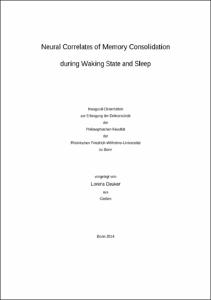Neural Correlates of Memory Consolidation during Waking State and Sleep

Neural Correlates of Memory Consolidation during Waking State and Sleep

| dc.contributor.advisor | Reuter, Martin | |
| dc.contributor.author | Deuker, Lorena | |
| dc.date.accessioned | 2020-04-19T15:59:10Z | |
| dc.date.available | 2020-04-19T15:59:10Z | |
| dc.date.issued | 08.05.2014 | |
| dc.identifier.uri | https://hdl.handle.net/20.500.11811/5975 | |
| dc.description.abstract | Memory consolidation is a theoretical process by which initially labile memory traces become more stable. The neuronal mechanism supporting this stabilization is thought to include a spontaneous reactivation of the same neuronal activity that was present during learning in task-subsequent periods of resting state and sleep. This reactivation is hypothesized to support information transfer from the hippocampus, which is conceptualized as a “fast learner” and temporary memory storage, to the neocortex, in which slow reconfiguration of neuronal connections leads to an integration of new memories into an existing network of life-time experience and knowledge. In rodents, evidence for reactivation has been found in the form of the coordinated replay of experience-related place-cell firing sequences during sleep and quiet resting state. In humans, increased activation of memory related brain structures has been observed after exposing participants to odor cues which were associated with the task. Subliminal sound cues during sleep have been shown to selectively enhance memory for those stimuli they were associated with during a learning task. In this thesis, a new method of identifying stimulus-specific neuronal activity patterns, multi-variate pattern analysis (MVPA), is employed to search for these neuronal patterns in resting state and sleep after a memory task. Three studies are presented which use functional magnetic resonance imaging (fMRI), alone or combined with simultaneous electroencephalography (EEG), and intracranial EEG recordings in epileptic patients. The impact of reactivation-related neuronal activity on memory performance for normal and emotionally negative stimuli is investigated. In two of the three studies, a relationship between the frequency of stimulus-specific reactivation and later memory performance were found, even though adequate control conditions have to be discussed. The conclusions of this thesis are that MVPA is well suited to decode the neuronal signatures of individual stimuli and can be useful for tracking these neuronal signatures across periods of resting state and sleep. | en |
| dc.language.iso | eng | |
| dc.rights | In Copyright | |
| dc.rights.uri | http://rightsstatements.org/vocab/InC/1.0/ | |
| dc.subject | Gedächtnis | |
| dc.subject | Konsolidierung | |
| dc.subject | Reaktivierung | |
| dc.subject | fMRT | |
| dc.subject | Hippocampus | |
| dc.subject | MVPA | |
| dc.subject | Memory | |
| dc.subject | consolidation | |
| dc.subject | reactivation | |
| dc.subject | replay | |
| dc.subject | fMRI | |
| dc.subject.ddc | 150 Psychologie | |
| dc.title | Neural Correlates of Memory Consolidation during Waking State and Sleep | |
| dc.type | Dissertation oder Habilitation | |
| dc.publisher.name | Universitäts- und Landesbibliothek Bonn | |
| dc.publisher.location | Bonn | |
| dc.rights.accessRights | openAccess | |
| dc.identifier.urn | https://nbn-resolving.org/urn:nbn:de:hbz:5-35906 | |
| ulbbn.pubtype | Erstveröffentlichung | |
| ulbbnediss.affiliation.name | Rheinische Friedrich-Wilhelms-Universität Bonn | |
| ulbbnediss.affiliation.location | Bonn | |
| ulbbnediss.thesis.level | Dissertation | |
| ulbbnediss.dissID | 3590 | |
| ulbbnediss.date.accepted | 20.12.2013 | |
| ulbbnediss.institute | Philosophische Fakultät : Institut für Psychologie | |
| ulbbnediss.fakultaet | Philosophische Fakultät | |
| dc.contributor.coReferee | Axmacher, Nikolai |
Dateien zu dieser Ressource
Das Dokument erscheint in:
-
E-Dissertationen (713)




